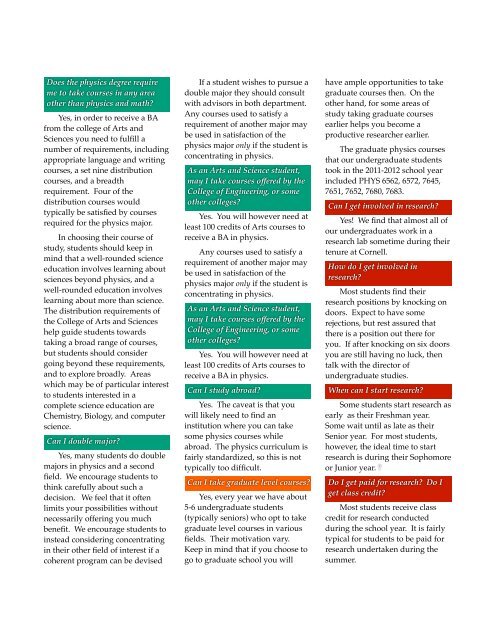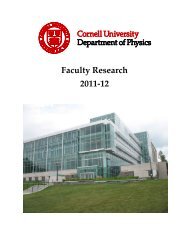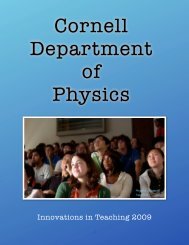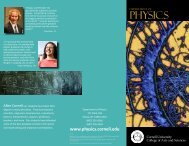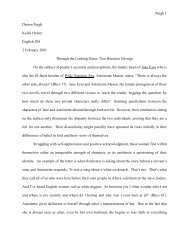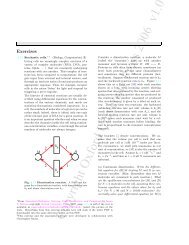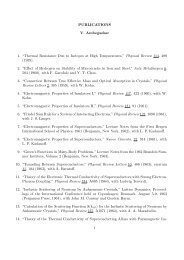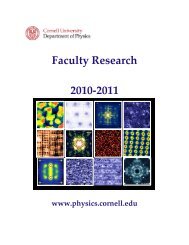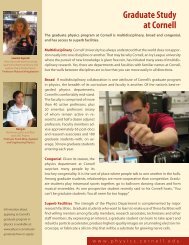Physics Freshman Brochure
Physics Freshman Brochure
Physics Freshman Brochure
- No tags were found...
Create successful ePaper yourself
Turn your PDF publications into a flip-book with our unique Google optimized e-Paper software.
Does the physics degree require<br />
me to take courses in any area<br />
other than physics and math<br />
Yes, in order to receive a BA<br />
from the college of Arts and<br />
Sciences you need to fulfill a<br />
number of requirements, including<br />
appropriate language and writing<br />
courses, a set nine distribution<br />
courses, and a breadth<br />
requirement. Four of the<br />
distribution courses would<br />
typically be satisfied by courses<br />
required for the physics major.<br />
In choosing their course of<br />
study, students should keep in<br />
mind that a well-rounded science<br />
education involves learning about<br />
sciences beyond physics, and a<br />
well-rounded education involves<br />
learning about more than science.<br />
The distribution requirements of<br />
the College of Arts and Sciences<br />
help guide students towards<br />
taking a broad range of courses,<br />
but students should consider<br />
going beyond these requirements,<br />
and to explore broadly. Areas<br />
which may be of particular interest<br />
to students interested in a<br />
complete science education are<br />
Chemistry, Biology, and computer<br />
science.<br />
Can I double major<br />
Yes, many students do double<br />
majors in physics and a second<br />
field. We encourage students to<br />
think carefully about such a<br />
decision. We feel that it often<br />
limits your possibilities without<br />
necessarily offering you much<br />
benefit. We encourage students to<br />
instead considering concentrating<br />
in their other field of interest if a<br />
coherent program can be devised<br />
If a student wishes to pursue a<br />
double major they should consult<br />
with advisors in both department.<br />
Any courses used to satisfy a<br />
requirement of another major may<br />
be used in satisfaction of the<br />
physics major only if the student is<br />
concentrating in physics.<br />
As an Arts and Science student,<br />
may I take courses offered by the<br />
College of Engineering, or some<br />
other colleges<br />
Yes. You will however need at<br />
least 100 credits of Arts courses to<br />
receive a BA in physics.<br />
Any courses used to satisfy a<br />
requirement of another major may<br />
be used in satisfaction of the<br />
physics major only if the student is<br />
concentrating in physics.<br />
As an Arts and Science student,<br />
may I take courses offered by the<br />
College of Engineering, or some<br />
other colleges<br />
Yes. You will however need at<br />
least 100 credits of Arts courses to<br />
receive a BA in physics.<br />
Can I study abroad<br />
Yes. The caveat is that you<br />
will likely need to find an<br />
institution where you can take<br />
some physics courses while<br />
abroad. The physics curriculum is<br />
fairly standardized, so this is not<br />
typically too difficult.<br />
Can I take graduate level courses<br />
Yes, every year we have about<br />
5-6 undergraduate students<br />
(typically seniors) who opt to take<br />
graduate level courses in various<br />
fields. Their motivation vary.<br />
Keep in mind that if you choose to<br />
go to graduate school you will<br />
have ample opportunities to take<br />
graduate courses then. On the<br />
other hand, for some areas of<br />
study taking graduate courses<br />
earlier helps you become a<br />
productive researcher earlier.<br />
The graduate physics courses<br />
that our undergraduate students<br />
took in the 2011-2012 school year<br />
included PHYS 6562, 6572, 7645,<br />
7651, 7652, 7680, 7683.<br />
Can I get involved in research<br />
Yes! We find that almost all of<br />
our undergraduates work in a<br />
research lab sometime during their<br />
tenure at Cornell.<br />
How do I get involved in<br />
research<br />
Most students find their<br />
research positions by knocking on<br />
doors. Expect to have some<br />
rejections, but rest assured that<br />
there is a position out there for<br />
you. If after knocking on six doors<br />
you are still having no luck, then<br />
talk with the director of<br />
undergraduate studies.<br />
When can I start research<br />
Some students start research as<br />
early as their <strong>Freshman</strong> year.<br />
Some wait until as late as their<br />
Senior year. For most students,<br />
however, the ideal time to start<br />
research is during their Sophomore<br />
or Junior year. <br />
Do I get paid for research Do I<br />
get class credit<br />
Most students receive class<br />
credit for research conducted<br />
during the school year. It is fairly<br />
typical for students to be paid for<br />
research undertaken during the<br />
summer.


